circuits test 2
1/17
There's no tags or description
Looks like no tags are added yet.
Name | Mastery | Learn | Test | Matching | Spaced |
|---|
No study sessions yet.
18 Terms
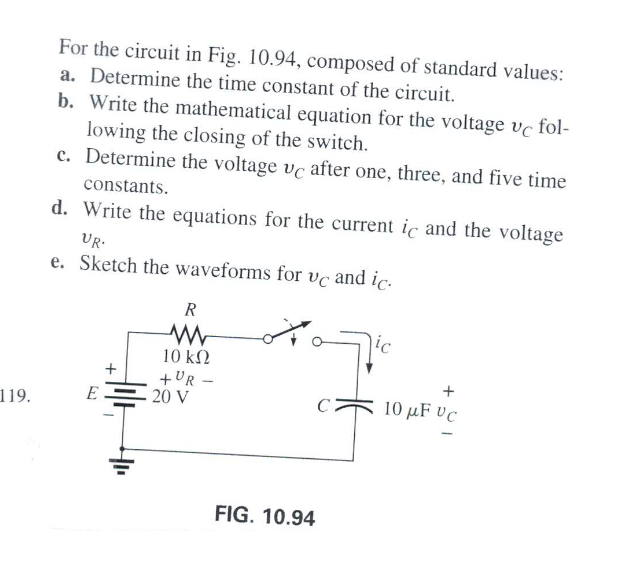
Ch10 q1
A. Time constant(tau or T) = R*C=10,000Ohms*(10×10^-6)F = 0.1 Seconds
B. Vc=V(1-e(-t/Tau)) = 20(1-e-t/.1)
C. t1 =12.64 t3=19 t5=19.17
D. ic = V/R e-t/Tau= (20/10000) * e-t/Tau
vr = V*e-t/Tau = 20*e-t/.1
E. voltage starts at zero, and levels off at the supply voltage. The current starts at the max(2mA) and reduces to zero
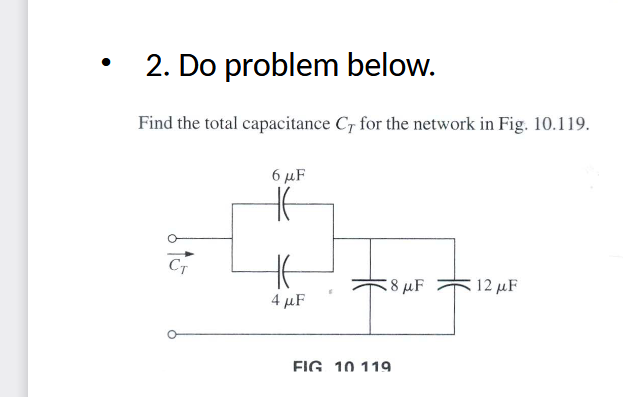
Ch10 q2
Capacitors in parallel add together, and 6+4=10 and 8+12=20. Next capacitors in series equal the product of the capacitance, over the sum, and (10×20)/10+20 = 6.667mF

ch11 p1
A. Tau = L/R = 20,000/(470×10-6)=23.5×10-6s
B.first determine max current imax=V/R = 40/20000 = 2mA
il= imax*(1-e-t/Tau)=.002(1-e-t/Tau)
C.
vl= V*e-t/Tau
vr= V*(1-e-t/Tau)
D. Il 1t1.264 3t=1.9 5t=1.986mA
vl: 1t=14.72V 3t=1.96V 5V=.28V
E. Current starts at zero, and goes the max value, the voltage starts at the max and goes to zero.
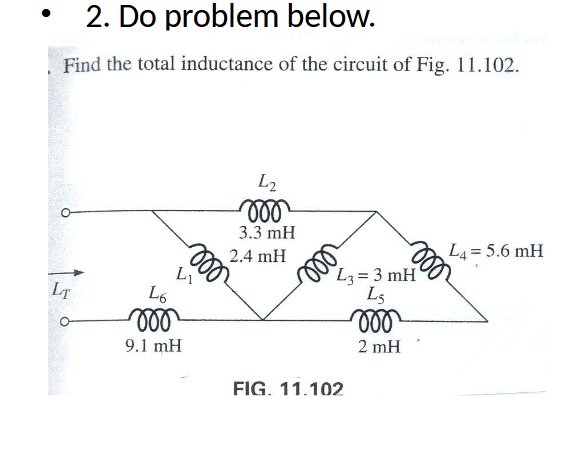
Ch11 p2
10.77mH
4+5 in series, then in Parallel with 3, in series with 2,in Parallel with 1, and in series with 6.
1. Name six equipment that depend on magnetic effects to function
properly?(ch12 q1)
Motors, generators, transformers,
loudspeakers, relays, medical equipment
depend on magnetic effects to function
properly.
What is a hysteresis curve?(ch12 q2)
A typical curve of flux density B versus the magnetizing force H (hysteresis curve) is shown in Fig. 12.5.
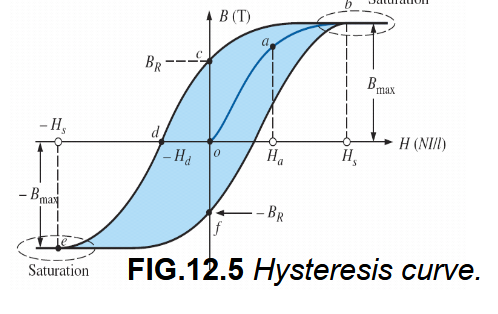
What makes it possible to create permanent magnets?(ch12 q3)
he flux density BR which remains when the magnetizing force is zero, is called the residual flux density.
• It is this residual flux density that makes it possible to create permanent magnets.
What is the most widespread use of a Hall Effect sensor?(ch12 q4)
The most widespread application is a trigger for an alarm in large department stores, where theft is often a difficult
problem
What does Magnetic Resonance Imaging (MRI) provide?(ch12 q5)
Magnetic resonance imaging (MRI) provides quality cross sectional images of a body for medical diagnosis
and treatment.
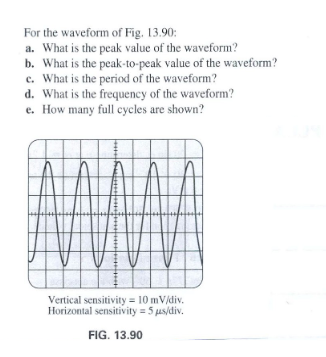
ch13 q1
The vertical and horizontal sensitivity below the graph indicate how much each division of the graph is in the vertical and horizontal direction.
A. 28mV(Highest value the function attains)
B56mV(difference between top and bottom)
C.10microSeconds(time between peaks of the function)
D. 1/(10×10-6)seconds = 100000Hz
E. 5
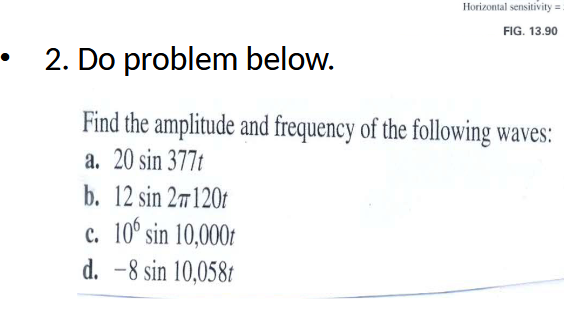
Ch13 q2
Wave functions are written as A*sin(ωt) Where A is the amplitude, and ω is 2*pi*frequency
A. A=20 ω=377/2pi = 60.00Hz
B. A=12 ω=2pi120/2pi = 120Hz
C. A=106 ω= 10000/2pi1591.55Hz
D. A=8 ω=10058/2pi = 1600.78Hz
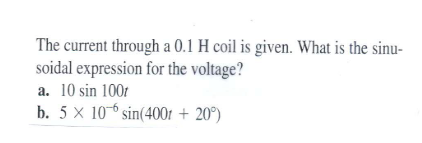
ch14q1
vl=Vm*sin(wt+90)
A. Xl= wL = 100*.1 = 10Ohms
. Vm=A*Xl=10×10 = 100
. 100sin(100t + 90)
B. Xl=wL = 400*.1 = 40Ohms
. Vm=A*Xl= (5×10^-6)*40 = (2×10-4)
.(2×10-4) sin( 400t + 110)

ch14 q2
Ic=Imsin(wt+90)
Im=A/Xc
Xc=1/wC
A. Xc = 1/200*(1×10-6) = 500Ohms
. Im=30/5000 = .006Amps
. Ic =0.006sin(200t+90)
B. Xc = 1/377×1×10-6 = 265.252
Im = (60×10-3)/2652.52 = (2.26×10-5)
Ic=(2.26×10-4)sin(377t+90)

Ch14 q3
PF = Watts / (Volts*amps)
100/(150×2) 1/3
0/(150×2) = 0
300/(150×2) = 1
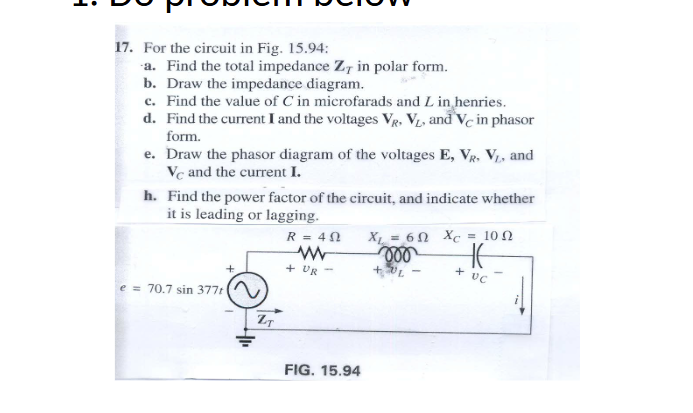
Ch15 q1
A. sqrt(32) < -45 degrees = Zt
B. Xlpoints straight up, xrpoins to the left, XC points straight down
C. Xc = 1/wc 10=1/377c c=1/3770=265microFarads
. Xl =wl 6=377l l=6/377 L=.0016H
d.E=Vmax / sqrt(2) = 50<0 degrees I=E/Zt = 8.83<45 deg
Vx=I*Xelement
Vr=
Vc=
Vl=
E. Vl leads current by 90degrees
Vr is in phase with current
Vc lags current by 90 degrees
H. Fp = cos(-45) = 0.707, leading because Xc >Xl
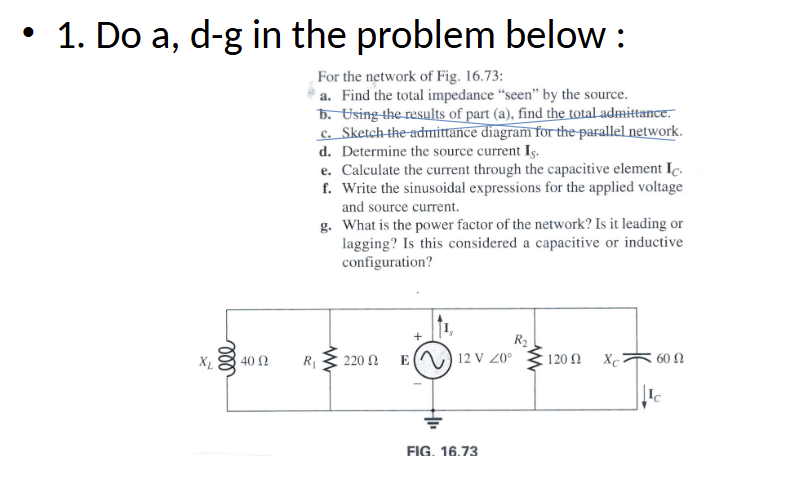
ch16
A. Zrl= (ZR*ZL)/ZR+ZL
Zrc = (ZR*ZC)/ZR+ZL
ZT=Zrl*Zrc/Zrl+Zrc = 65.2W<32.91
D. E/Zt = 12/ 65.2<32.91 = .184A<32.91
E. V/Zc=12/(60< -90)=.2A<90
F.e=(20*sqrt(2))sin(wt)
i=(20/Xt)sin(wt-32.63)
g. Fp=cos(32.9)= 0.842,lagging
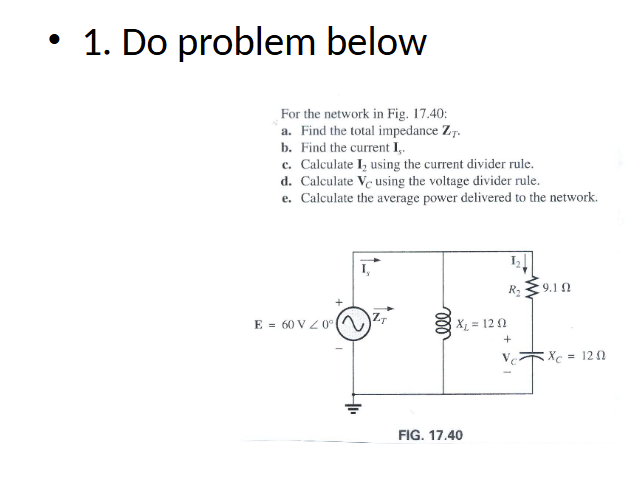
ch17
A. Zrc=9.1-12j
Zt=19.86<37.2
B I=E/Zt = 3.02 < -37.2
C I2 = I*Zl/(Z1+Z2) = 3.98A<52.8
D. Vc = ZcE/Zt = 47.81V < -37.2
e P = V*I cosTheta = 60×3.02 *cos(37.2)=144.33W
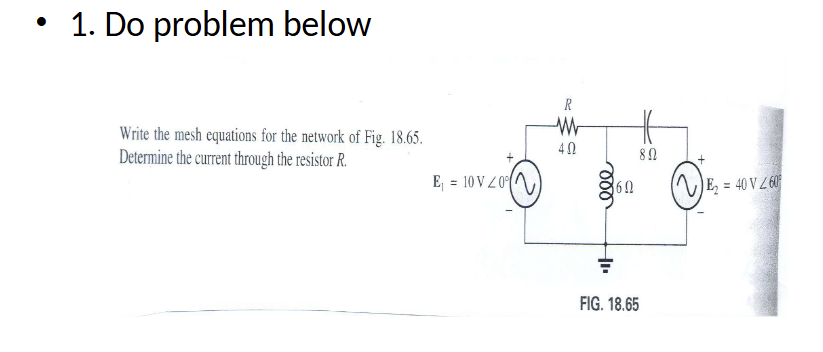
ch18 q1
5.15A< -24.5, write equations for KVL, then solve system of equations